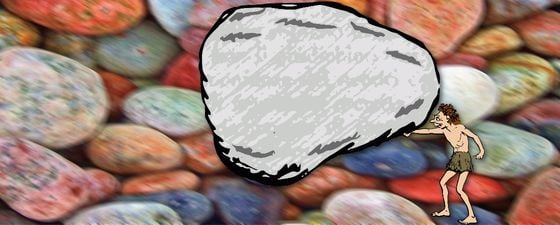Geoscientists do not seem to be able to inspire other people with enthusiasm for their subject. What can be done about this?
Penny: What’s wrong with geology?
Sheldon: Let me put this in a way you’ll understand, Penny. You remember you explained to me that the Kardashians aren’t real celebrities? Well, geology is the Kardashians of science.
The Big Bang Theory
How much do most people know about geology and what do they actually think about the subject?
Finding for themselves the answers to these questions is one of the first things that students on a radical new course at Plymouth University in the UK are asked to do. They go onto the campus and ask fellow students from a wide variety of disciplines what geology means to them.
“It’s all about stones” and “Rocks – boring!” were fairly typical answers – but they were also met with blank looks and “what’s geology?”
How did they respond?
With difficulty; they realized that despite several years studying the subject, they still did not really know how to explain their science to someone without a technical background. Addressing this issue is what this course is largely about.
Different Communication Skills Required
“The MGeol course allows geology students to spend an extra year refining their skills, exploring specialist topics and learning critical thinking with respect to their subject. An important part of that is communicating geoscience, which is why it is a compulsory module in this final year,” explains Professor Iain Stewart, Chair in Geoscience Communication at the university’s Centre for Research in Earth Sciences.
“In their undergraduate studies we teach young geologists facts and the importance of facts, and we show them how to write for a technical audience. Then we send them out into the real world and they discover that lots of this doesn’t matter, and they also need to explain more than just the bald facts. Wherever they end up working – be it industry, research or teaching – good communication abilities, both written and verbal, will prove to be one of the most important aspects of their work. We have discovered that communications skills are as important as technical prowess in increasing your chance of promotion. Even getting through that first interview is about communication. And team work Is an integral part of any job, and for that good communication is needed at all levels.”
Prof. Iain Stewart lecturing at the University of Plymouth. He believes that every talk, whether to final year geologists or a public meeting, should be a performance with communicating your message in an entertaining and informative way at its core. (Source: University of Plymouth)
“We also need different types of communication skills for different parts of every job,” he continues. “It is important that geologists are able to write succinct scientific reports – but they must also to be able to produce the more flowery, descriptive stuff. There are no rules for this type of thing, except understanding your audience. And don’t be afraid to entertain! In my opinion even giving a lecture should be a performance.”
Iain believes that as geoscientists we are taught to think in a different way to most people. “For a start, we must visualise in 3D,” he points out. “Thinking about the subsurface at great depth and talking casually about the vastness of geological time are what we do all the time, but for most people these are difficult concepts. And many geoscientists seem to regard risks and hazards from a different perception to the rest of the world, who are usually less enthusiastic about looking into a bubbling volcano or climbing a cliff face than we are! So we need to ‘re-engineer’ our brains so we can approach the subject from a different viewpoint.
“With this in mind, we ensure that our students have lectures from a range of disciplines, from both within the university and the wider community beyond.”
Interdisciplinary Approach
Professor Stewart is no stranger to the interdisciplinary approach, as he studied both geography and geology in his undergraduate degree, before undertaking a PhD researching earthquakes in the Mediterranean, which brought in aspects of archaeology, climatology and history, as well as geology.
Prof. Stewart, Chair in Geoscience Communication at the university’s Centre for Research in Earth Sciences.
After twelve years as a university lecturer, he stepped out of academia to make films and documentaries about earth sciences. As he says: “I am interested in a wide range of subjects. That’s not ideal for the academic life, but perfect for telly! I spent some time talking to film-makers about why, unlike sciences such as archaeology and cosmology, we didn’t see much about geology on TV, particularly considering it is so perfect for the medium: a long history, amazing scenery and epic events like continents breaking up.”
Returning to the academic fold in 2002 at Plymouth, Iain has spent the past 15 years trying to bridge that gap and bring geology to the masses. He has made a number of high profile BBC documentaries on earth science, with topics ranging from how geology has shaped the world to analyses of the impact of shale gas and the story of oil (see GEO ExPro Vol. 13, No 1 – Planet Oil). He is also the Director of the Sustainable Earth Institute at Plymouth University, which aims to promote a new way of thinking about the future by bringing together researchers, businesses, community groups and individuals to develop cutting-edge research and innovative approaches to global challenges. An indication of this is Plymouth’s new MSc course in Sustainable Geoscience, which addresses the increasingly contested societal interface between geology and sustainable development.
It’s all about encouraging young geoscientists to think outside of the box. “We want to give our students the ability to engage with a range of different audiences, and to help them do this we bring in lecturers from a variety of disciplines, including neuroscience, business, chemistry and astrophysics,” Iain explains.
Students in the final year of the MGeol course are relishing the interdisciplinary approach used in the Communicating Geoscience module. From left: Robert Hendry, Tessa Young, Catherine Woolford, Prof. Stewart, Luke Silezin, Martha Ezeribe and Jack Palmer. (Source: Jane Whaley)
Breaking Down Barriers
I was able to spend some time with the students, to find out what they thought about the course and what it was teaching them, and it was obvious that they enjoyed the interdisciplinary approach.
“The neuroscience lectures were fascinating”, one of the students tells me. “We learnt how the brain works differently in scientific and communication mode and how we must address but not judge our audience. Effective communication is a two-way street, where we need to be able to meet half way and to build up a baseline of trust, otherwise people won’t listen to us. We also learnt about the ‘dos and don’ts’ of outreach and engagement and how to adapt our message and way of delivering it to different audiences, since to talk to families or children requires a very different approach to that used when addressing a specialist group. Not everyone needs to know all the facts, but they need to know the ones of importance to them.“
About 60% of the lecturers on the Communicating Geoscience module are not geoscientists, but the students find they are often better at putting geological ideas across, simply because they are not experts in the subject. “We are shown how to look at communicating to non-geoscientists as a performance; a bit like a play in three acts,” another student explains. “First we hook the audience with wonderful ideas; then we take them on an exciting journey with twists and turns, to spike their curiosity, to a false resolution at the end of the ‘second act’, before getting to the real ending and a genuine resolution – preferably with plenty of humour.”
Communication comes in many forms and students spend time discussing the most appropriate medium for different messages and audiences, taking in blogs and social media, podcasts, videos, documentaries and art, all in an attempt to break down the tangible barrier between scientific facts and public viewpoints.
Disseminate Your Knowledge
The students on this course have very different plans for where they want geology and their careers to take them, but they all agree that learning to communicate the excitement and fascination of geoscience has been a very important and useful journey for them.
As one of their interdisciplinary lecturers – this time from a chemistry background – pointed out to them: disseminate knowledge as much as you can and whenever you can. It’s not their fault if people don’t understand your subject – it’s yours!
Further reading from Geo ExPro
Planet Oil by Nikki Jones
The BBC continues its mission of energy education with good results. This article appeared in Vol. 13, No. 1
Social Seismic: Petroleum and the Public by Iain Stewart and Hazel Gibson
How do we win the battle for community hearts and minds? This article appeared as a Web Exclusive in June, 2016
The Next Generation of Petroleum Geoscientists by Staff Writer
Royal Holloway, University of London recently celebrated 30 years of their MSc course in Petroleum Geoscience. To mark the occasion, they hosted a 30 year Celebratory Symposium with speakers comprising alumni as well as past and present staff members. This article appeared in Vol. 13, No. 1
Communication is Crucial by Jane Whaley
If you have an interesting story to tell, how do you get your message across to colleagues, to the oil industry – and to the rest of the world? This article appeared in Vol. 9, No. 4





